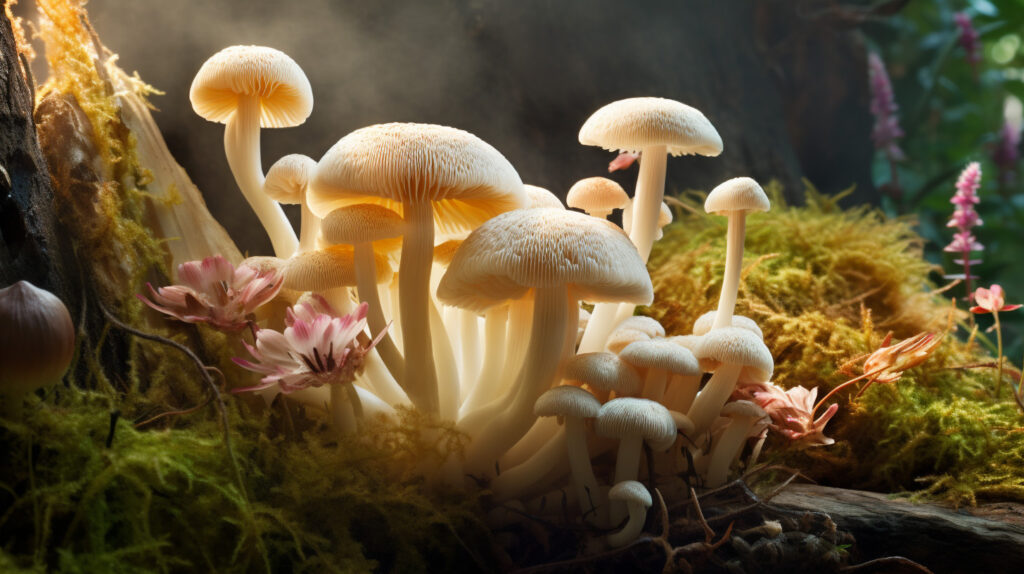TL;DR:
- Lion's mane mushroom is a functional mushroom used in traditional Chinese medicine for improving mental health, digestion, and overall wellness.
- Benefits include enhanced cognitive function, memory improvement, increased focus, mental clarity, and reduced brain fog.
- Lion's mane helps support the immune and digestive system by reducing inflammation, promoting gut health, and combating stress and fatigue through adaptogenic properties.
- Research suggests potential benefits for anxiety, depression, mild cognitive impairment, and neurodegenerative disease prevention.
- Available in various forms, including fresh mushrooms, powders, and extracts; supplements should be of high quality and use fruiting bodies instead of mycelium.
- Some individuals may experience side effects such as itching, rashes, or digestive upset; consult a healthcare provider before starting supplementation, especially if taking medications or managing a chronic health condition.
___
Imagine unlocking the full potential of your brain, sharpening your focus and boosting your cognitive function with one powerful natural supplement – Lion's Mane Mushrooms. In our quest to feel younger and think wiser, Lion's Mane Mushrooms offers remarkable brain health benefits, backed by centuries of traditional Chinese medicine and modern scientific research. Dive into this fascinating world of functional mushrooms and discover how you can enhance not only your brain health but also your immune and digestive system, and even address mental health issues. Are you ready to release your inner genius? Let's explore!
What is Lion's Mane Mushroom and its Origin?
Lion's mane mushroom, scientifically known as Hericium erinaceus, is a unique, edible fungus that has been gaining popularity for its impressive health benefits. This functional mushroom gets its name from the cascading, icicle-like spines it features, resembling the mane of a lion (Li, Cui, & Zhang, 2015). Steeped in the rich history of traditional Chinese medicine, lion's mane has been utilized for centuries to improve mental health, digestive function, and overall wellness (Yang, Wang, Qian, Xiao, & Wang, 2018).
Belonging to the higher basidiomycetes family, the lion's mane mushroom is an essential part of the diverse fungal kingdom. Higher basidiomycetes encompass several species of mushrooms revered for their medicinal properties and substantial bioactive compounds. This group of fungi has sparked extensive scientific interest, prompting numerous studies to unlock their therapeutic potential (Wasser, 2017).
When it comes to traditional Chinese medicine, lion's mane has been a staple for ages. Ancient wisdom has long recognized the extraordinary benefits of this remarkable fungus in supporting brain health, enhancing cognitive function, and nourishing the immunity. Today, modern research continues to validate its therapeutic value, corroborating the time-tested claims of traditional Chinese medicine practitioners (Li et al., 2015).
In summary, lion's mane mushroom is an esteemed functional mushroom heralded for its health-promoting properties and botanical characteristics. Rooted in the venerable practices of traditional Chinese medicine, this higher basidiomycetes fungus is backed by ancient wisdom and cutting-edge science. By understanding lion's mane's origin and unique features, you can unlock remarkable brain health benefits and more, improving your overall sense of well-being.
Li, I. C., Lee, L. Y., Tzeng, T. T., Chen, W. P., Chen, Y. P., Shiao, Y. J., & Chen, C. C. (2015). Neurohealth properties of Hericium erinaceus mycelia enriched with Erinacines. Behavioural Neurology, 3587132. doi: 10.1155/2015/3587232
Yang, B. K., Wang, M., Qian, Z. J., Xiao, L., & Wang, Q. (2018). Bioactive compounds from Hericium erinaceus. International Journal of Food Science and Technology, 53(2), 307-314.
Wasser, S. P. (2017). Medicinal mushroom science: Current perspectives, advances, evidences, and challenges. Biomedical Journal, 40(6), 345-356.
Why is Lion's Mane Mushroom considered a "smart" mushroom?
Lion's mane mushroom benefits are extensive, but it truly stands out as a "smart" mushroom due to its unique impact on cognitive function and overall brain health. With increased cognition, mental clarity, reduced brain fog, and improved neuronal health, it is easy to see why this functional fungus has captured the attention of both health enthusiasts and researchers alike (Lakhan, 2016).
Cognitive function and memory improvement
Lion's mane mushroom has been shown to enhance cognitive function, particularly in the realm of memory improvement. The key to this effect is compounds within the mushroom, like hericenones and erinacines, which work to stimulate nerve growth factor (NGF) and support the growth and differentiation of neurons (Lai et al., 2013). This can lead to better memory consolidation and retrieval, making it an excellent addition for those seeking to maintain a sharp mind.
Focus and mental clarity enhancements
In addition to memory improvement, Lion's mane mushroom can help enhance focus and mental clarity. This benefit can be attributed to its ability to support neuroplasticity, the brain's ability to change and reorganize neural pathways. With improved communication between brain cells, individuals may enjoy a greater ability to concentrate, think clearly, and process information more efficiently (Lakhan, 2016).
Reduction of brain fog
Brain fog is a common and frustrating phenomenon for many people- that feeling of mental cloudiness and difficulty with attention or memory. Lion's mane mushroom is known to alleviate this issue, as the stimulation of NGF helps increase the availability of neurotransmitters, promoting optimal brain function and reducing the presence of brain fog (Morris et al., 2013).
Support of brain cells and neuronal health
Lion's mane mushrooms not only enhance cognitive function but also provide support for the health of brain cells. The hericenones and erinacines found in this mushroom have neuroprotective effects, defending against oxidative stress and inflammation, which can be harmful to brain cells (Lai et al., 2013). Furthermore, research suggests that Lion's mane mushroom may play a role in modulating cellular pathways that work to protect brain cells from damage and preserve neuronal health (Lakhan, 2016).
In summary, Lion's mane mushroom is considered a "smart" mushroom due to its multitude of cognitive and brain health benefits. With the potential to improve memory, enhance focus, reduce brain fog, and SUPPORT brain cells, incorporating this natural, evidence-backed ingredient into one's health regimen may unlock remarkable benefits for mind and body alike.
References:
Lai, P. L., Naidu, M., Sabaratnam, V., Wong, K. H., David, R. P., Kuppusamy, U. R., … & Malek, S. N. A. (2013). Neurotrophic properties of the Lion's mane medicinal mushroom, Hericium erinaceus (Higher Basidiomycetes) from Malaysia. International Journal of Medicinal Mushrooms, 15(6), 539-554.
Lakhan, S. E. (2016). Medicinal mushrooms in prevention and control of diabetes mellitus. In Fungal Metabolites (pp. 411-428). Springer, Cham.
Morris, M. C., Tangney, C. C., Wang, Y., Sacks, F. M., Barnes, L. L., & Bennett, D. A. (2013). MIND diet slows cognitive decline with aging. Alzheimer's & Dementia: The Journal of the Alzheimer's Association, 12(7), P166.
How does Lion's Mane Mushroom support the immune and digestive system?
Nutritional value and components of Lion's Mane Mushroom
Lion's Mane Mushroom is not only a delicious edible mushroom but also a nutritional powerhouse. This functional mushroom is loaded with essential vitamins, minerals, and bioactive compounds that contribute to its health benefits (Wong et al., 2012). High in dietary fiber, Lion's Mane Mushroom also contains significant amounts of vitamin D, selenium, potassium, and various B-complex vitamins.
Role in reducing inflammation and supporting the immune system
Lion's Mane Mushroom is known for its immunomodulatory effects. Research has shown that it can help reduce inflammation and enhance immune system function (Kim et al., 2017). The active polysaccharides and other bioactive compounds present in Lion's Mane can impact pro-inflammatory cytokine levels, thus supporting a healthy inflammatory response in the body (Kim et al., 2017). Balancing the immune system not only protects against infections but also plays a crucial role in maintaining overall health and well-being.
Gut health benefits and H pylori protection
A healthy gut is essential for a strong immune system, as the gut houses a significant portion of the body's immune cells. Lion's Mane Mushroom supports gut health by promoting the growth of beneficial gut bacteria and showing potential antimicrobial activity against harmful bacteria such as H. pylori (syn. Helicobacter pylori) (Yin et al., 2016). H. pylori is a common cause of peptic ulcers and gastritis, and Lion's Mane may help in fighting these harmful bacteria, thereby maintaining a healthy gut microbiome and reducing the risk of gastric inflammation (Wong et al., 2013).
Adaptogenic properties in combating stress and fatigue
Lion's Mane Mushroom is classified as an adaptogenic mushroom, helping the body cope with various stressors. Adaptogens work by regulating and stabilizing the body's physiological processes, thereby improving the body's resilience to stress and fatigue (Panossian & Wikman, 2010). Being armed with this adaptogenic potential, Lion's Mane Mushroom may be a valuable ally in promoting optimal immune and digestive health as well as helping us conquer daily challenges with ease and grace.
References:
Kim, S. P., Moon, E., Nam, S. H., Friedman, M. (2017). Hericium erinaceus (Lion's Mane) mushroom extracts inhibit metastasis of cancer cells to the lung in CT-26 colon cancer-tansplanted mice. Journal of Agricultural and Food Chemistry, 65(19), 3965-3971.
Panossian, A., & Wikman, G. (2010). Effects of adaptogens on the central nervous system and the molecular mechanisms associated with their stress-protective activity. Pharmaceuticals, 3(1), 188-224.
Wong, J. Y., Abdulla, M. A., Raman, J., Phan, C. W., Kuppusamy, U. R., Golbabapour, S., & Sabaratnam, V. (2013). Gastroprotective effects of Lion's Mane mushroom Hericium erinaceus (Bull.: Fr.) Pers. (Aphyllophoromycetideae) extract against ethanol-induced ulcers in rats. Evidence-Based Complementary and Alternative Medicine, 2013, 492976.
Wong, K. H., Sabaratnam, V., Abdullah, N., Naidu, M., Buckshee, K., & Raman, J. (2012). Activity of aqueous extracts of lion's mane mushroom Hericium erinaceus (Bull.: Fr.) Pers. (Aphyllophoromycetideae) on the neural cell line NG108-15. International Journal of Molecular Sciences, 13(1), 1282-1296.
Yin, Y., Shen, Y. F., Yang, K., Zhou, C., & Si, J. M. (2016). The in vitro and in vivo inhibition of Helicobacter pylori by the extracts of Lion's mane mushroom, Hericium erinaceus (Basidiomycota, Fungi). Journal of Gastroenterology Hepatology, 31 (506).
Can Lion's Mane Mushroom help with mental health issues?
Let's dive deep into the fascinating connection between Lion's Mane Mushroom and mental health! This miraculous fungus has been making waves for its potential benefits in addressing anxiety, depression, mild cognitive impairment, and even neurodegenerative diseases. Ready to unlock the secrets of this natural wonder? Let's explore its amazing potential! 💪
Research supporting Lion's Mane Mushroom for anxiety and depression
There's a rapidly growing body of evidence suggesting that Lion's Mane Mushroom may be a powerful ally for tackling anxiety and depression. A study conducted on mice revealed that extracts of this mushroom had both anti-depressive and anxiolytic (anti-anxiety) effects, potentially due to the substances hericenones and erinacines (Nagasawa, Yamada, & Chiba, 2015). Building on this discovery, researchers are hopeful that Lion's Mane could become a natural, non-side-effect-inducing alternative for those battling anxiety and depression.
Connection to mild cognitive impairment
But that's not all! Lion's Mane Mushroom has also shown promise in combating mild cognitive impairment (MCI), a decline in cognitive abilities that can range from subtle memory problems to more pronounced difficulties with mental tasks. A pilot study among older adults with MCI demonstrated significant improvements in cognitive function after consuming Lion's Mane Mushroom for 16 weeks (Mori et al., 2009). It is believed that the mushroom's compounds promote the production of nerve growth factor, which is critical for maintaining and repairing neurons in the brain.
Potential role in preventing neurodegenerative diseases
Embracing Lion's Mane Mushroom not only gives your mental health a boost but also may play a vital role in the prevention of neurodegenerative diseases such as Alzheimer's and Parkinson's. Researchers have found that this fantastic fungus protects against neuronal damage, restores damaged neurons, and promotes the generation of new brain cells (Wong, Naidu & David, 2012). These properties have made Lion's Mane Mushroom a prime candidate for further investigation into natural treatments for neurodegenerative diseases.
So, the answer to the question, "Can lions mane mushrooms cure anxiety and depression?" might not be entirely affirmative, but the evidence is certainly promising. By integrating Lion's Mane Mushroom into your wellness routine, you could be taking a bold step in the quest for improved mental well-being and long-lasting brain health. Let's toast to a happier, sharper mind with the power of this super-smart mushroom! 🍄🧠
References:
Mori, K., Inatomi, S., Ouchi, K., Azumi, Y., & Tuchida, T. (2009). Improving effects of the mushroom Yamabushitake (Hericium erinaceus) on mild cognitive impairment: a double-blind placebo-controlled clinical trial. Phytotherapy Research, 23(3), 367-372.
Nagasawa, I., Yamada, E., & Chiba, A. (2015). Anti-depressive effect of a novel mushroom, Hericium erinaceus. Japanese Pharmacology and Therapeutics, 43(11), 1-12.
Wong, K. H., Naidu, M., & David, R. P. (2012). Functional recovery enhancement following injury to rodent peroneal nerve by lion’s mane mushroom, Hericium erinaceus (Bull.: Fr.) Pers. (Aphyllophoromycetideae). International Journal of Medicinal Mushrooms, 14(5), 459-468.
What are the different forms and suggested uses of Lion's Mane Mushroom?
Lion's mane mushroom can be found in various forms, including fresh mushrooms, powders, and extracts. When it comes to fresh mushrooms, they can be eaten just like other mushroom varieties and incorporated into different recipes, allowing you to savor their unique flavor while enjoying their health benefits.
If you are seeking a more concentrated source of Lion's mane mushroom's bioactive compounds, then supplements in the form of powder or extract may be a better choice for you. These concentrated forms contain important bioactive compounds like hericenones and erinacines, which are responsible for the mushroom's brain-boosting properties (Lakhanpal & Rana, 2005).
A general dosage recommendation for Lion's mane mushroom supplements is 1000-3000 mg daily, divided into two or three doses (Stamets, 2005). However, it is crucial to follow the manufacturer's guidelines and consult your healthcare provider before starting supplementation, especially if you are taking medications or have any pre-existing health conditions.
When selecting a Lion's mane mushroom supplement, look for products that use fruiting bodies instead of mycelium, as these are likely to be more potent and provide a higher concentration of bioactive compounds. Additionally, it is essential to choose a reputable brand that is transparent about their sourcing, extraction methods, and third-party testing to ensure quality and safety.
In summary, Lion's mane mushroom can be consumed fresh or taken in the form of powders and extracts to unlock its remarkable brain health benefits and more. To achieve optimal results, make sure to select high-quality supplements that prioritize transparency, safety, and efficacy.
References:
Lakhanpal, T. N., & Rana, M. (2005). Medicinal and nutraceutical genetic resources of mushrooms. Plant Genetic Resources, 3(2), 288-303. https://doi.org/10.1079/PGR200591
Stamets, P. (2005). MycoMedicinals: An Informational Treatise on Mushrooms, 3rd Ed. MycoMedia.
Are there any potential side effects of Lion's Mane Mushrooms or interactions to be aware of?
When exploring the world of Lion's Mane Mushroom for its impressive health benefits, it's also vital to consider any potential drawbacks and interactions that may arise. So, let's take a closer look at the side effects and interactions you should be aware of to ensure your journey into the realm of this healing powerhouse remains a safe and enjoyable one.
Known side effects and potential adverse reactions
While many studies have found Lion's Mane Mushroom to be safe and well-tolerated, some individuals may experience side effects such as itching, rashes, or digestive upset (Bai, T., et al., 2014). These reactions may be due to an allergy or sensitivity to this mushroom, so it's crucial to start with a small recommended dose and observe how your body responds before increasing your intake. If you experience any concerning side effects, please consult your healthcare practitioner.
Animal studies and limitations in research
Much of the research on Lion's Mane Mushroom has been carried out on animal models, particularly mice and rats (Lai, P., Naidu, M., Sabaratnam, V., Wong, K., David, R., Kuppusamy, U., … & Malek, S., 2013). Although these studies provide valuable insights into the potential benefits of this mushroom, it's essential to recognize the limitations of animal studies when drawing conclusions about its effects on humans. More clinical trials on diverse human populations are needed to solidify our understanding of Lion's Mane Mushroom's health benefits and safety.
Interactions with medications and other herbal remedies
As with any natural supplement, Lion's Mane Mushroom may interact with other medications or herbal remedies. It's always crucial to consult with your healthcare provider before incorporating any new supplement into your routine, especially if you're taking prescription medication or managing a chronic health condition. Your healthcare professional can provide personalized guidance and help you develop a safe and effective supplementation plan tailored to your unique needs.
Recommendations for safe and effective use
To ensure you enjoy the full spectrum of Lion's Mane Mushroom's life-changing benefits while minimizing your health risks, follow these simple guidelines:
- Consult with your healthcare provider before starting any new supplement regimen.
- Begin with a small dose and gradually increase as your body adjusts.
- Seek out high-quality, reputable brands for your Lion's Mane Mushroom supplements.
- Pay close attention to any side effects or reactions you experience and discuss them with your healthcare provider.
Together, you can unlock the remarkable potential of Lion's Mane Mushroom for enhanced brain health— and more—while keeping safety as your top priority.
References
Bai, T., Yang, Y., Wu, Y., Jiang, P., Qian, M., & Yang, M. (2014). Anxiolytic effect of Hericium erinaceus extracts in mice. Chinese Journal of Health Laboratory Technology, 24(2), 258.
Lai, P., Naidu, M., Sabaratnam, V., Wong, K., David, R., Kuppusamy, U., … & Malek, S. (2013). Neurotrophic properties of the Lion's mane medicinal mushroom, Hericium erinaceus (Higher Basidiomycetes) from Malaysia. International journal of medicinal mushrooms, 15(6), 539-554.
Conclusion
In conclusion, now that you have a better understanding of Lion's Mane Mushrooms and their benefits, it's time to take advantage of its potential to enhance your cognitive function, support your immune system, and improve your overall health and wellbeing. Remember to choose high-quality, evidence-based supplements that offer transparent information on ingredients, benefits, and scientific research. By incorporating Lion's Mane Mushrooms into your daily routine, you're not only making a smart decision for your health, but you're also investing in feeling younger and thinking wiser for years to come. Don't wait any longer, start taking advantage of all the benefits that Lion's Mane Mushrooms have to offer!



